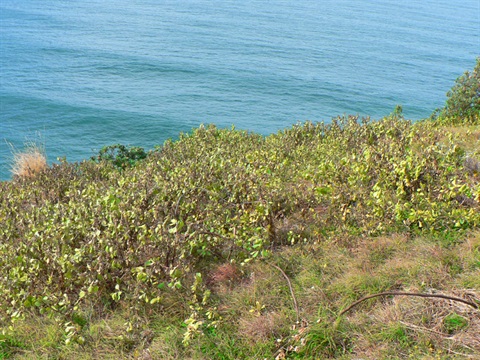Temporary closure of national parks for bitou bush spraying
Published on 03 May 2022

South African bitou bush is present along the Macleay Valley coast and is a highly invasive plant that smothers native plants and destroys native animal habitats.
NSW Government's National Parks and Wildlife Service (NPWS) has advised that aerial spraying of bitou bush along sections of Hat Head National Park, Goolawah National Park and Limeburners National Park is schedule to take place between Monday 16 May and Friday 27 May 2022.
Extensive toxicology studies have indicated the herbicide is safe to humans and its processes only occur in plants. Studies in mammals have shown the chemical is broken down quickly and eliminated from the body. Native plant species experience minimal impacts and survive and thrive following spraying. For more information on bitou bush, please visit the NSW WeedWise website.
The following walking tracks and areas in the the mentioned national parks will be temporarily closed for public safety. Please ensure you adhere to signs and directions of NPWS staff.
Smoky Cape Area:
- Smoky Cape Lighthouse
- Smoky Cape Picnic Area
- Jack Perkins Walking Track
- Gap Beach Road, Gap Beach North and South
- Green Island Fire Trail
- Little Bay Picnic Area
- Little Bay to Smoky Cape Lighthouse Walking Track
- Northern section of Smoky Beach
Hat Head Area:
- Kemps Corner Headland access road from Hungry Road
- Killick Beach 4WD access road from Hungry Road
- Kemps Headland and walking track
- Korogoro Circuit Walking Track
- Gap Carpark
- Connors Beach and Third Beach
- Connors Hill Trail
- Northern section of Killick Beach
Crescent Head Area:
- Back Beach Access
- Goolawah Beach
- Barries Beach & Plomer Road
- Big Hill Walking Track
- Queens Head Picnic Area
- North Shore Beach (adjacent to Limeburners National Park
- North Shore Beach access tracks
- Plomer Road – Queens Head to Broken Bit
For updates on the spraying program and temporary closures visit NSW National Parks and Wildlife Service or call the NPWS Macleay office on (02) 6561 6700.